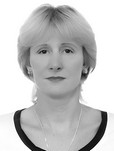КОР Reebok core deck benefits for academic physical education service
Фотографии:
ˑ:
PhD, Associate Professor I.F. Kalinina
Technological University, Korolev, Moscow Region
The study analyzes benefits of the Кор Reebok Core Deck (training deck with triple-axis rotation disk) for academic physical education service in the functionality and physicality building and motivational aspects. This training machine is known to secure good neuromuscular training to improve the body balancing, movement coordination and control skills and movement efficiency. Benefits of the technology were tested by educational experiment. Sampled for the study were the first-year students of Moscow Region «University of Technology» split up into the Experimental and Reference Groups (EG, RG) of 20 people each and trained for two semester (9 months in total).
The sample functionality was rated by the body mass, fat mass and quiescent-state HR rating tests; plus the Romberg test. And the sample physicality was rated by (1) standing long jump test; (2) 4x9m shuttle sprint test; (3) prone push-ups bench test; (4) bent forward bench test with the arms down the bench; (5) recumbent trunk bent test; and (6) 1-min squats test.
The experiment proved benefits of the training model as verified by the EG progress in the physical fitness, joint flexibility and injury prevention domains.
Keywords: physical education, physical development, reactive neuromuscular training, training process efficiency.
References
- Arkhipova T.N. Rol fizicheskoy kultury v obespechenii gigieny nervnoy sistemy. Issledovanie razlichnykh napravleniy psikhologii i pedagogiki [Role of physical education for hygiene of nervous system. Study of various areas of psychology and pedagogy]. Proc. Intern. res.-pract. conf. (25 April 2018). Ufa: OMEGA SCIENCE publ., 2018. pp. 14–15.
- Kalinina I.F., Smirnov A.A. Ozdorovitelnaya napravlennost zanyatiy fizicheskoy kulturoy i ikh vliyanie na funktsionalnoe sostoyanie organizma studentov [Health-prioritizing physical education classes and their influence on functional state of students' body]. Sotsiologiya. 2016. no.3. p. 199–203.
- Kalinina I.F., Tkachenko A.V. Zanyatiya fizicheskoy kulturoy kak uslovie i faktor ukrepleniya zdorovya studencheskoy molodezhi [Physical education as condition and factor in students' health improvement]. Pedagogicheskiy zhurnal. 2017. v. 7. no. 2 A. pp. 443–448.
- Moguev B.D. Fizicheskoe vospitanie v usloviyakh globalizatsii sovremennogo obshchestva. Teoriya i praktika sovremennykh podkhodov [Physical education in context of globalization of modern society. Theory and practice of modern approaches]. Russkiy kosmizm: istoriya i sovremennost po Proc. III nat. res.-pract. conf.. 2018. pp. 175-178.
- Chaykovskaya O.E. Dvigatelnaya aktivnost – osnova borbyi s gipodinamiey [Motor activity against hypodynamia]. Fizicheskoe vospitanie i sport v vysshikh uchebnykh zavedeniyakh. 2016. pp. 298–301.




 Журнал "THEORY AND PRACTICE
Журнал "THEORY AND PRACTICE